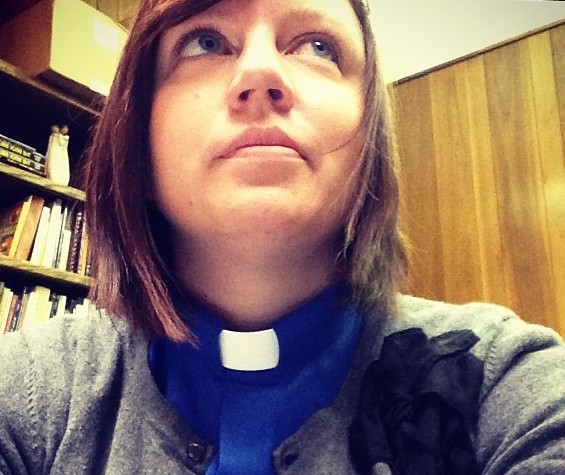Introduction
Sexual assault and sexual harassment are present in the Church and especially affect clergywomen in their roles as pastors, chaplains, advocates, and other ministry roles. In addition to regular microaggressions, Clergywomen have been assaulted like victims of Harvey Weinstein, restricted from advancement like employees of Mike Pence, and locked in unsafe environments like victims of Matt Lauer. We need to hear from clergywomen about their experiences to better know our own failures and integrate their affirmations of what to do differently.
I don’t have the personal experience to speak to sexual harassment, and as a male clergyperson, I cannot speak on behalf of clergywomen’s experiences. Personally, I’ve fallen short by being oblivious about situations or inappropriate with my language. I’m thankful for clergywomen who corrected my language and behavior, and who accepted my apologies when I said or did the wrong thing and caused harm. For this blog post, I knew that I wanted to stand with clergywomen, but I didn’t know how I could personally contribute.
So the content of this blog post is from clergywomen themselves. 52 clergywomen’s responses to a survey in October/November 2017 were collected by Hacking Christianity, lightly edited to provide anonymity, then a team of clergywomen (and one laywoman) compiled* and edited the responses and formed the below narrative. Finally, advertising revenue from this blog post will be donated to Lifewire, a women’s domestic violence advocacy service in Seattle, and any requests for comment or clarification from the blogger will be redirected to clergywomen.
The following are experiences shared by clergywomen and include recommended actions to keep them from happening in your congregation.
* It’s important to note that this is a small fraction of the comments and examples received (over 10,000 words). Indeed, many noted they had more examples but did not want to have them shared, even anonymously, out of fear of retaliation or shame or impacting current relationships.

1. When it comes to Comments, Stay Away From The Surface
From the responses, the most common theme by far is to STOP commenting on clergywomen’s appearance!
Some experiences:
“My attire is constantly an issue—length of dresses, pants versus dresses, fingernails, haircuts, pantyhose versus tights, size of high heel, colors, etc.”
“I cannot count the number of times I’ve been subjected to inappropriate comments based on my appearance during my tenure in ministry. I’ve been inappropriately touched by men and women. I’ve been told what I can and cannot wear, and no such restrictions have ever been put on male colleagues.”
‘I lie awake at night dreaming of you in that blouse. Be sure to wear it for your ordination interviews,’ was a comment from my boss who was also on the board of ordained ministry.”
Practical suggestions:
- If you’re inclined to compliment a clergywoman, then compliment her professional abilities.
“Check yourself before you compliment. Is it around someone’s appearance, or is it gender related? Maybe consider how you could rephrase a compliment so that it focuses on the clergywoman’s abilities, skills, or expertise objectively.”
“Demonstrate trust in our authority. Say things like, ‘Based on your education and research, what would you do in this scenario?’ Comment on intelligence and experience rather than appearances and feminine attributes. Listen and believe what we have to say.”
- Do not talk about a clergywoman’s fertility or sex life.
Because we already get these comments: ‘Seeing you pregnant in the pulpit just makes me think about sex!’ or ‘I don’t want to know that my pastor had sex to get pregnant. It’s creepy and gross.’
“Conversations about reproduction are almost never appropriate with your pastor, male or female. If your pastor wishes to talk about a pregnancy, or future pregnancy, she or he will. If your pastor does not wish to talk about it, she or he will not. Do not bring up the subject.”
2. Speak up against inappropriate language
Clergywomen are the recipients of sexist, ageist, and grotesque language by male colleagues and parishioners alike.
Some experiences:
“Is it okay if I call you Pastor Babe?”
“I cannot count the number of times I have been called ‘sweetie,’ ‘honey,’ ‘kiddo,’ ‘young lady,’ or similar, but some days it far outnumbers my title of the Rev. or deacon. Some men also feel that they have the right to kiss the top of my head or let their hug linger longer than a quick hello hug most others give. And I have never heard a lead pastor step in and correct anyone.”
Practical Suggestions:
- Male colleagues and parishioners must speak up for clergywomen even when they are not present. Saying “that’s not appropriate” to correct behavior in private might keep it from happening in public.
“The silence of bystanders communicates that sexual harassment is okay. Stop making excuses for men’s behavior–your own or someone else’s.”
- Use appropriate titles, as you would for men (like “Rev” not “Miss”)
“So often our time and our bodies are presumed to belong to the men around us, and that comes with telling you about our harrowing stories about the struggles of being a woman. The best gift you can give us is autonomy.”

3. Touching. What is it with the touching?
Physical touch is experienced differently by clergywomen than clergymen.
Some Experiences:
“I’ve experienced sexually suggestive comments, inappropriate touching, men standing too close and hugging too long, unwanted back rubs, catcalls, and comments like, ‘Want to sit on my lap and go for a ride?’ by the 90 year old who needs to use the chairlift to get into the sanctuary.”
“’In this church, we hug titty to titty and tinky to tinky,’ came from a retired pastor in my church, whose hugs I fended off the next five years.”
“One of my colleagues taught me the ‘clergywoman pivot’ to avoid inappropriate hugs. There’s a way to put your weight on your feet that allows you to swing your body to turn a full body contact hug to a side hug. We then practiced for 20 minutes until I could instinctively get out of any unwanted hug.“
Suggested actions:
- Don’t touch women unless they invite it (ie. “May I give you a hug?”)
“Don’t touch, and don’t accuse clergywomen who don’t touch of being cold and standoffish.”
4. Equal, but not the same
Clergy colleagues and male parishioners alike must recognize clergywomen as equal to but not the same as clergymen.
Some Experiences:
“At one church, I and my lead pastor (also a woman) were given personal alarm buttons to wear, similar to a life alert system, to contact 911 in case of trouble. The male assistant pastor was not.”
“Male coworkers and supervisors not having closed-door conversations and meetings with me often meant that I was not afforded the same theological reflection as my male counterparts in field education and internship experiences.“
“Colleagues who do not ride in the car with women to whom they are not married means I have to meet them at the destination.“
“I endured an accusation of sexual misconduct (while pregnant) in part because I met in private conversations with my much older, male, head of staff; because I was the only female participant in a male clergy lunch group and often carpooled with my male colleagues to attend our weekly lunches; and I was seen on various occasions hugging or laughing with these male colleagues (who were all old enough to be my father). The accusation taught me to be fearful of interactions with my most direct support system and isolated me from trusted colleagues with whom I professionally had the most in common. This sexual misconduct accusation and the way denominational leadership handled it (while clearing me of any wrongdoing) felt like sexual harassment or even sexual abuse. I still feel anxiety when I am the only woman at the table in clergy interactions, even though I am frequently the only female pastor or even the only woman at the table. I participate anyway, because to choose not to take part has professional opportunity and financial consequences.”
Practical Suggestions:
- “but not the same” references honoring things like a nursing mother’s need for privacy and the need for others to intervene when witnessing sexism/harassment
“Treat us like you would treat male colleagues. Expect from us what you would expect from male colleagues. Pay us what you would pay male colleagues. Listen to us like you would to male colleagues. Appoint us like you would male colleagues.”
“Would I make that comment to the man sitting next to me? Would I touch my male colleague that way? Do I think of my male priest/pastor/professor/ etc in those terms? No? Then stop doing it to women.”
“Treat us with the same respect you give male colleagues. I’m not asking for special treatment. I’m asking for equal respect and a voice that’s heard.”

5. BELIEVE THEM.
The respondents included many mentions of the need to believe women when they describe/report harassment, abuse, unfair treatment, sense of danger, etc.
Some experiences:
“I have been harassed by an elderly man who wanted to marry me, continually over many months, causing me very high levels of stress. When I asked a male clergy colleague to speak to the guy, he said he was too busy. Another male colleague called the police, against my wishes. That made me feel violated again.”
“I had to call several clergy sisters to figure out how to proceed, because there is no training on what to do when a church member harasses a clergywoman; all of my boundary training has been on how to not harass anybody.”
“Every time I make a mistake and I wonder if this is going to be the mistake that labels me ‘ineffective.’ I work twice as hard as I should because of this fear. “
“The thing that troubles me the most about this is that all those men, every last one of them, just laughed right along with him. No one talked to me about it.”
Practical suggestions:
- Take clergywomen seriously–from reporting inappropriate behavior to professional matters and decision making–believe them!
“When I was newly in my first church, a retired former pastor invited me to lunch. He offered to answer any questions I had, and he was honest and trustworthy about it. I finally asked one of my big questions, which was that one of the men in the church set off all my red flags, and I wasn’t interested in getting close enough to him to find out why, but wondered if this colleague could tell me. He responded, ‘I have no idea, nothing I know about him [that] would explain that, but if that is your sense of him, whatever you do, stay FAR away.’ In those words he gave a very new pastor permission to trust her instincts.”
- Advocate for clergywomen among staff, congregation, and community
“It shouldn’t be the harassed person’s responsibility to name the harassment”
- Amplify women’s voices.
- Give credit where credit is due
“Believe women when they have strange feelings about someone or tell you someone has said or done something inappropriate. Ask them how you can help in addition to keeping their confidence.”

6. Practical Actions
Some Experiences:
“Male colleagues take up all the space and all the time in clergy meetings (though it’s not sexual harassment, it is a power display, which is a root of sexual harassment).”
“I also had an older colleague serving in a different congregation invite me to his office to share some criticism of an event I had spoken at. Upon arriving at his office he shut his door hard and I heard the lock click. That closed and locked door was incredibly threatening, and he was completely unaware that the closed door and the automatic locking of it might be threatening or disconcerting to a woman in a conversation (about anything at all).”
“My (male) district superintendent once harshly criticized me for sitting behind my desk and intentionally opening the blinds when he and I went to my office for a conversation after an evening meeting…Pointing out that my behavior with him during that conversation was about good boundaries and Safe Sanctuaries policy did not change his mind in the least.”
Practical Suggestions:
- Put windows in office doors right now. It matters much more if male clergy asks for it before a female colleague works there.
“Any woman that follows you will thank you because it means that she won’t have to ask the board, session, etc. to install these and have to hear about the ‘extra’ costs of having a ‘lady pastor’ who is worried about unnecessary things. ‘The doors of the church were just fine til she got here.’ No, they weren’t.”
- Put in the policy that parents need/deserve parental leave, regardless of gender.

7. Further Reading & Study
“80% of clergy reported experiencing sexual harassment in the Church in our 2005 study.”
– Leigh Goodrich, GCOSROW
For further study, the General Commission on the Status and Role of Women is an agency of The United Methodist Church. They just concluded a very analytical study and statistical analysis about the experience of sexual harassment in United States UMC churches as a follow-up to their 2005 study. Look for GCOSROW’s release of their study in January/February 2018.
For further reading, the following are suggested readings from clergywomen directly that speak to their experience. In no particular order:
- http://gracefall.org/pastors-secrets/the-statistics/
- https://thatshowthelightgetsin.wordpress.com/2017/10/22/good-men-me-too-and-the-rise-of-nazism/
- https://rockthatcollar.com/2017/10/24/what-i-need-men-in-the-church-to-understand-about-sexual-violence/
- https://badassladypastor.com/2017/08/29/not-today-satan/
- http://thesaltcollective.org/21-stories-pastors-sexually-harassed-abused-inside-churches-metoo/
- http://umsexualethics.org/
- https://youngclergywomen.org/tag/sexual-assault/
- http://www.umcna.org/hertruth
- https://youngclergywomen.org/me-too/
- https://rachelmariemcdonald.blogspot.com/2013/10/heels.html
- http://www.ministrymatters.com/all/entry/6150/women-clergy-distractingly-sexy
- http://lutheranjulia.blogspot.com/2016/10/say-it-say-it-say-it.html
- https://rockthatcollar.com/2017/10/18/a-taxonomy-of-creeps/
Leave other suggestions in the comments!
Your Turn
One participant wrote:
“It’s very important for us to lift up the ways that so many women (clergy and lay) have experienced harassment or inappropriate conduct of all kinds in church. It’s very important for churches to be aware and to actively work to fight against the culture of misogyny that is all around us. I also want to voice that at least some churches are doing a good job of being safe, healthy places for women (and all people). I want to affirm those things in my congregation and encourage them to express their implicit values/practices explicitly as part of the way they let their light shine.”
Thoughts? Contributions? Further reading suggestions? Post them in the comments!
Thanks for reading, commenting, and sharing on social media. Most of all: support clergywomen at all times.
====
Related Content on Hacking Christianity:
- Clergywomen are not equal to men [A churchy version of the viral letter by Jared Mauldin about female engineers]
- Mind the Chasm: Reflections on the Clergywomen Wage Gap [12 reflections of clergywomen’s experience]
- Empty Vessels no more: defending women in the abortion debate [guest clergywoman post]




And HOLD YOUR ANNUAL CONFERENCES ACCOUNTABLE if they do not have the policies around sexual harassment that the Book of Discipline requires, namely, a policy for handling sexual harassment when a lay person is the perpetrator and the clergy person is the victim.
Thank you, Jeremy, for calling attention to this very ugly sin in the United Methodist Church. Clergywomen have suffered for decades. Church sexual ethics training never brings up harassment of clergywomen by clergymen or by powerful laymen in the UMC, nor the microaggressions these women experience. It’s the elephant in the room. I hope some concrete action happens in the name of justice for clergywomen.
Thank you, Jeremy. Once again you have sought out authenticity and truth. I greatly appreciate your awareness and attention to detail within this particular piece by soliciting compilation and editorial assistance from female clergy/colleagues. Thank you for lending your blog space as a forum for this much needed conversation. May the dialog continue and may the church be better for your efforts and the efforts of many others. Blessings!
Thank you, Jeremy, for your support and your continued truth-telling. These suggestions are very practical and clear. May every Board of Ordained Ministry read them, as well as clergy and lay leaders, district superintendents and bishops. Maybe everyone who is United Methodist should read them! I can almost feel the glass ceiling quivering a bit!
Thank you for such a timely (isn’t it always?) subject. I do want to point out that the Rev Dr Marie Fortune at Faith Trust Institute did deal with clergywomen in one of our required boundary trainings. She covered things I had never even thought of and provided knowledge and support for incidents that happened in the future. While a senior male pastor was also there, he did not have the fortitude to stand up for me, so I learned to do it for myself and other women on staff.
I participated in this survey, yet do not feel my experience is adequately represented. The examples lifted up here are reprehensible, but I urge you to tell the dirtier truths, too. They exist and need to be exposed.
Thanks for your comment, Adrienne. We reposted 2,000 of the 10,000 words submitted, so I’m sorry your story didn’t make the selection. Let me know how you would like your story told. umjeremy at gmail